Why Dutch 'bike banks' are a game changer for kids
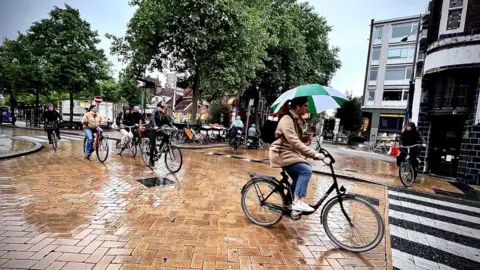 Anna Holligan
Anna HolliganThe Dutch like to say that children in the Netherlands learn to cycle before they can walk.
While it may be an urban myth, it is common to find oneself dodging toddlers careering around on two wheels.
In a society geared towards the humble bicycle, riding one is just part of everyday life.
So what happens when you can no longer afford this basic mode of transport? The cost-of-living crisis has resulted in a surge of families in the Netherlands turning to bike banks to ensure their children are not left behind.
The Royal Dutch Touring Club ANWB has created a scheme which transforms discarded second-hand bikes into cycle-path worthy condition
Demand for refurbished bikes is soaring. Last year, one group in Amsterdam received more than 400 requests for help. So far this year it has already had 1,200 applications.
I visited one such project in a relatively underprivileged district of The Hague.
I arrived, by cargo bike, to the sound of sirens. Inge Veliscek from the ANWB explained there had been a ruckus about some of the volunteers smoking outside someone's home on the canal front.
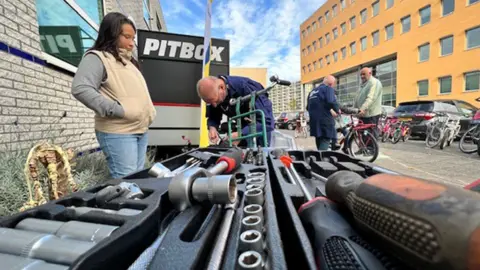 Anna Holligan
Anna HolliganThis bike bank project doubles as a social enterprise which offers teenagers who have dropped out of school the chance to learn a trade, alongside life lessons on punctuality and budgeting.
Some of the volunteers working alongside them are retired. "We are also giving them a new lease of life," Inge jokes, nudging an elderly gentleman, wielding a screwdriver, affectionately in the ribs.
"But seriously, they have vital skills which they can pass onto the next generation and while they are active and involved in the community, they also have a better quality of life, and it's all thanks to the bicycle!"
As we are talking a rainbow array of bikes is wheeled into a semicircle next to a mini course chalked out on the chewing gum encrusted pavement. Here, everyone who takes away one of these donated bikes is tested to ensure they are proficient enough to use it, without endangering themselves or others.
Melanie and her husband approach cautiously.
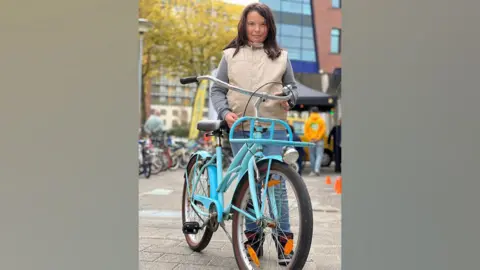 Anna Holligan
Anna HolliganPoverty still holds some stigma in a country which expects people to, as one Dutch friend put it, "just shut up and get a job and don't complain".
The cost of living crisis has created more awareness of, and compassion for, those struggling to make ends meet as a result of forces beyond their control, including inflation and the tripling of energy bills.
According to the most recent figures, in September 2022, inflation in the Netherlands hit an all-time high of 14.5%, while energy prices shot up 200% compared with the same time last year. People are paying more for food, fuel, clothing, public transport and education.
Nevertheless, Melanie's eyes well up as she tells me she is ashamed she and her husband can't afford to provide for their three children.
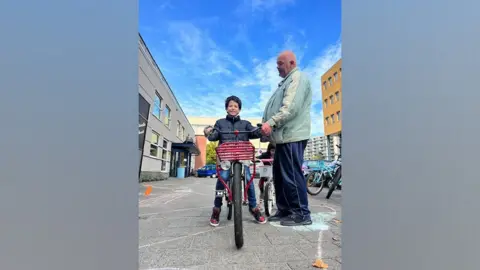 Anna Holligan
Anna HolliganHer older two, Milan (9) and Sanne (11), are being ridiculed at school because they cannot do something all their classmates can.
Melanie tells me there's simply no wiggle room in their budget. "First it's the bills, then the groceries, then there is no money left for anything else."
Sanne has picked out a sky-blue bike. She's sitting, gripping the handlebars and grinning as the volunteers adjust the saddle so her feet can safely touch the ground.
Most Dutch children take it for granted that they will own a bike.
But watching Melanie and her kids made me realise cycling is a privilege and an increasing number of people are missing out.
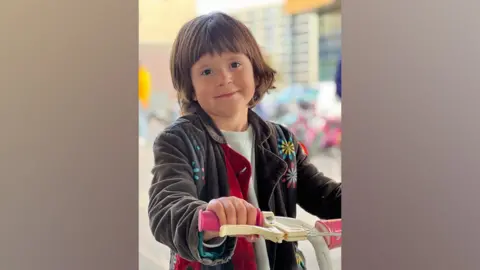 Anna Holligan
Anna Holligan"It is a hidden poverty," Inge Veliscek seems to read my mind. "You just don't see the people who can't ride because they are stuck at home, they cannot participate in the same way as we expect everyone can."
And it's not just the financial poverty, not having a bicycle can result in multiple layers of disadvantage.
"In Holland, you need a bicycle to join in, to go to your football or to your friends or the school of your choice," says Inge.
"If you don't have a bicycle, these people here don't have the money to take the bus or tram. With a bike you can actually join in the world, which makes your world bigger."
Melanie tells me she wants her son to go to a better school, in a better neighbourhood, that's too far to walk to but if he learns to cycle it will be within his reach.
Conscious of the potential health benefits for the whole family, she assured me she and her husband would be encouraged to run round the park to make sure their children get up to speed.
"Pretty!" giggles five-year-old Emma, her face gleaming just like her new set of wheels.
In a country where there are more bikes than people, Emma can now participate with pride.
"If you have a bicycle," smiles Inge, fixing a unicorn bell onto Emma's handlebars, "you have freedom. So at least they have a chance to have a better future, maybe better than their parents. We hope so anyway. And perhaps that's because of the bicycle".
